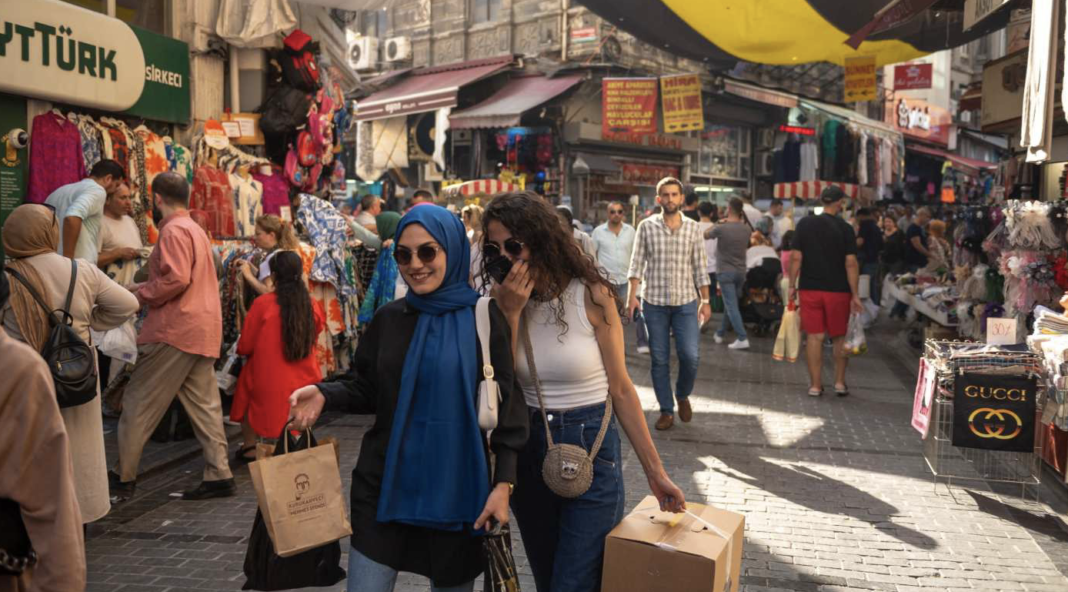Legacies of Kemal Atatürk era resonate in the age of strongman Recep Tayyip Erdoğan.
October 14, 2023, Tony Barber, Financial Times.
Welcome back. Preparations are in full swing in Turkey for the 100th anniversary of the modern republic, proclaimed on October 29 1923. The republic was founded on the ashes of the Ottoman Empire by Mustafa Kemal Atatürk, a hero in the eyes of millions of Turks for having led the nation to independence and embarking on an extensive, rapid modernisation of state and society.
Yet Atatürk’s legacy is by no means uncontested. Under Recep Tayyip Erdoğan, the strongman president who has led Turkey for no fewer than 20 of the republic’s 100 years, some Islamists and nationalists have increasingly found fault with aspects of Atatürk’s rule. Most secularists and liberals, by contrast, continue to defend him. As the republic begins its second century, how should we assess his legacy and what lies ahead for Turkey domestically and in the international arena? I’m at tony.barber@ft.com.
We can break down the question of Atatürk’s legacy into five areas: foreign policy; democracy and authoritarianism; the Kurdish issue; Islam in Turkey; and the economy.
One hundred years of the Turkish Republic
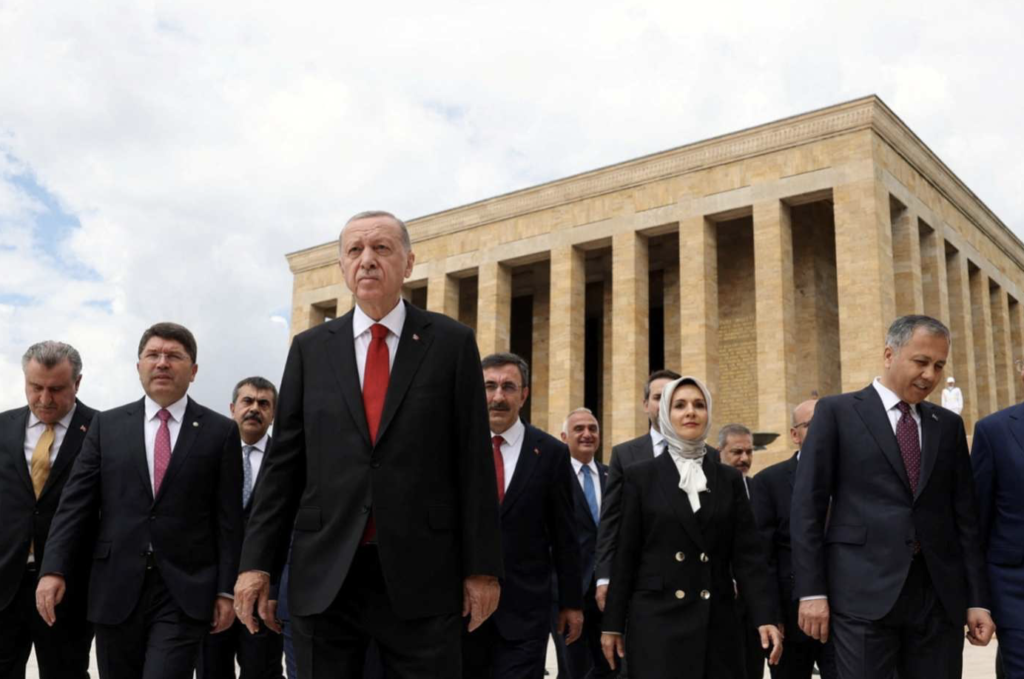
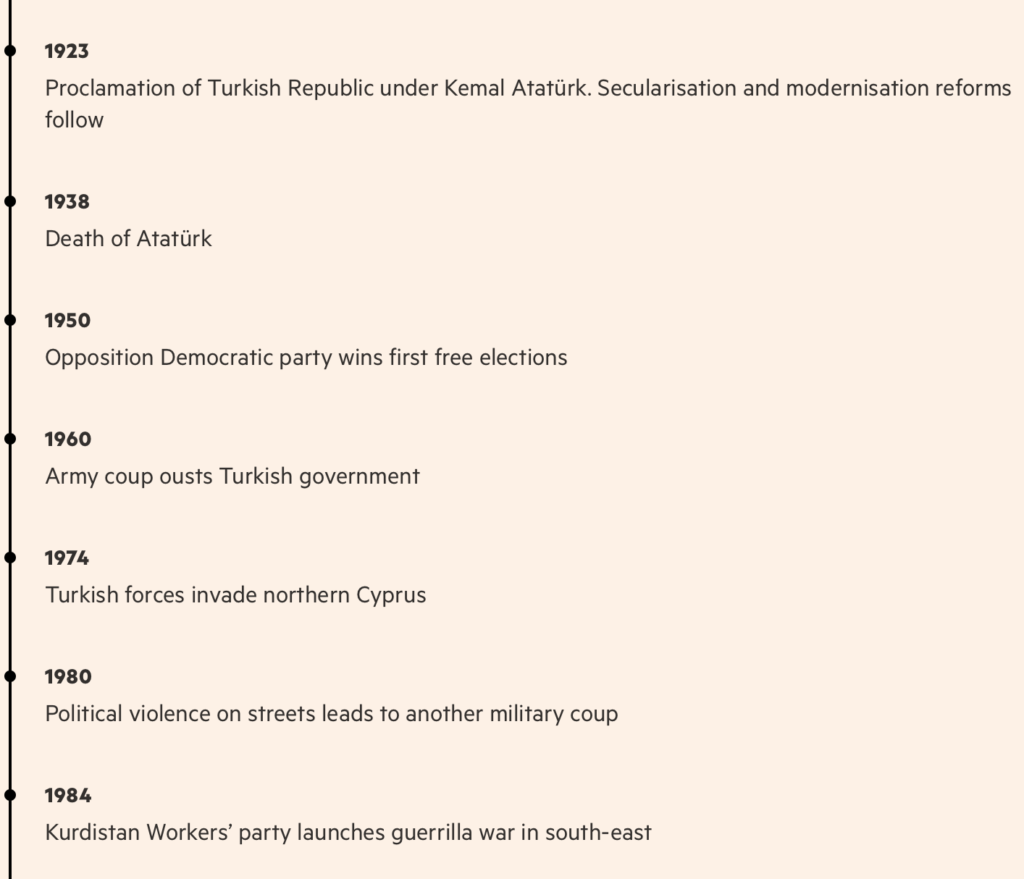
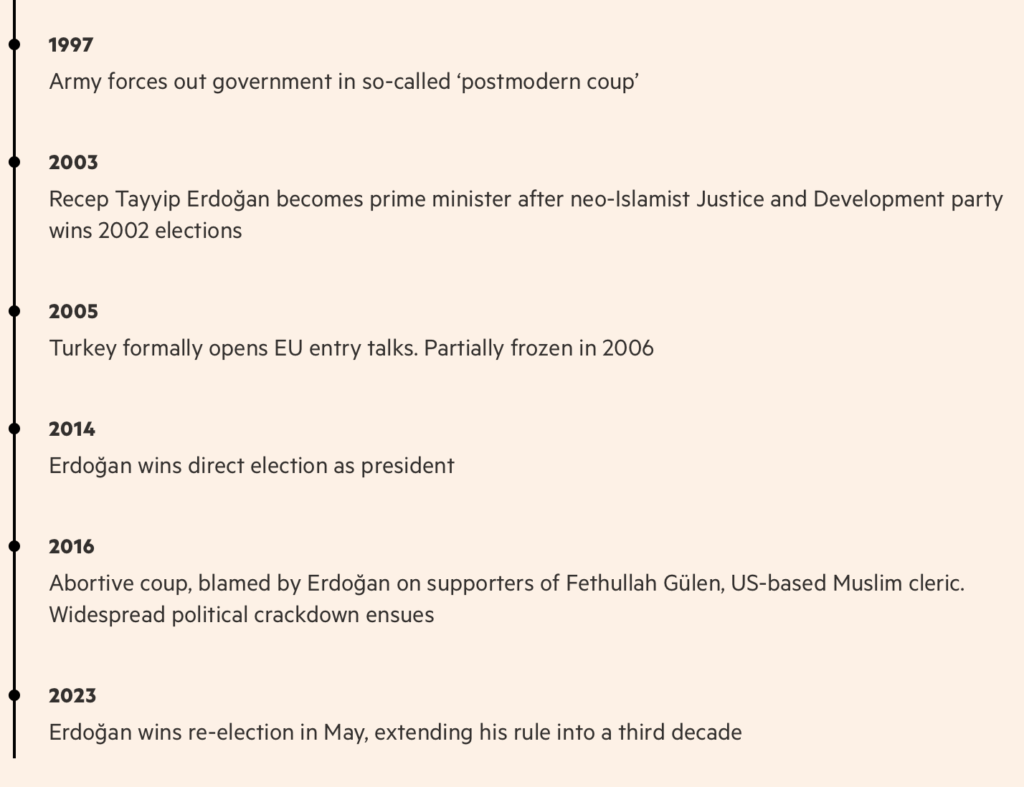
Turkey and the west
Between 1923 and his death in 1938, Atatürk kept Turkey out of the political, ideological and military confrontations between democracy, fascism and communism that defined international affairs in the interwar period. Under his successor, İsmet İnönü, Turkey stayed out of the second world war.
In part, these policies reflected the ambiguities in Turkey’s relationship with the west thrown up by Atatürk’s far-reaching reforms: the abolition of the caliphate, the introduction of the Latin alphabet, the use of dress codes that blurred differences between Turks and Europeans, and much more.
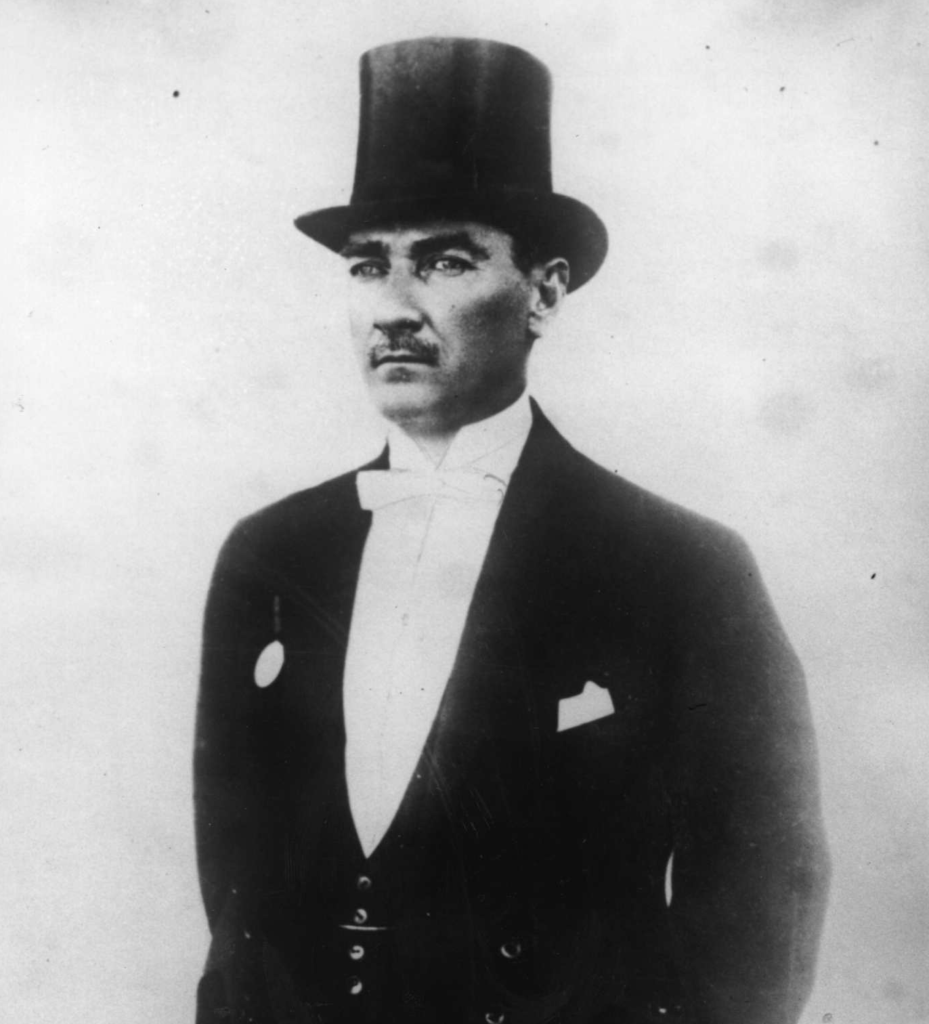
Orhan Pamuk, the Turkish winner of the 2006 Nobel literature prize, put it brilliantly in Istanbul: Memories and the City, when he reflected on the transition from empire to republic.
When the empire fell, the new republic, while certain of its purpose, was unsure of its identity; the only way forward, its founders thought, was to foster a new concept of Turkishness, and this meant a certain cordon sanitaire to shut it off from the rest of the world . . .
With the drive to westernise and the concurrent rise of Turkish nationalism, the love-hate relationship with the western gaze became all the more convoluted.
Autonomy in foreign policy
Later, with the advent of the cold war, Turkey felt obliged for its own security to join Nato in 1952. It also built a close relationship with what became the EU, and made a formal application in 1987 to join the bloc (Turkey’s membership prospects have been bleak for some years now).
Since the end of the cold war, and particularly since Erdoğan came to power in 2003, we have seen the re-emergence of the idea, prevalent in Atatürk’s time, that Turkey’s interests are best served by carving out a high degree of autonomy in foreign affairs.
My attention was caught this week by an episode that captures this trend.
On a visit to Ankara, Austrian chancellor Karl Nehammer suggested that Erdoğan could play a constructive role in calming the Israel-Hamas war. Perhaps Nehammer overstated Erdoğan’s influence, but there’s no doubt that the Turkish president has plenty of contacts at the highest level.
Last month, on the sidelines of the annual UN General Assembly in New York, he met Israeli premier Benjamin Netanyahu for the first time in person. The talks were a sign of improved relations after a frosty period caused by an Israeli attack in 2010 on a convoy of ships carrying aid to the Gaza Strip. A number of Turks were killed in that raid.
Meanwhile, two months before the New York talks, Erdoğan played host in Ankara to Mahmoud Abbas, the Palestinian leader, and Ismail Haniyeh, the leader of Hamas.
These meetings underscore Erdoğan’s desire to position Turkey, despite its Nato membership and deep economic ties with the EU, as an autonomous regional power with roles to play from north Africa, the Middle East and the south Caucasus to Ukraine and central Asia.
Human rights prize
Now let’s look at a second legacy of Atatürk — the nature of Turkey’s political system.
Under Atatürk, the new republic was no democracy. It was a one-party state with one man running the show. This style of rule rested to some extent on “the authoritarian legacies shaping the state” in the Ottoman period, as Dimitar Bechev wrote in his 2022 book Turkey Under Erdoğan.
Gradually, Turkey evolved in a pluralistic, democratic direction. The opposition Democratic party won the nation’s first free elections in 1950. Occasional military coups interrupted Turkey’s political development in the second half of the 20th century, but the armed forces never held power for long — unlike, say, in Latin America or the Middle East.
Under Erdoğan, the authoritarian impulses of the Atatürk era have returned. The trend was highlighted this week when the Council of Europe, a pan-European club dedicated to protecting democracy and the rule of law, awarded its main human rights prize to Osman Kavala, a jailed Turkish activist. As was to be expected, this award offended the authorities in Ankara.
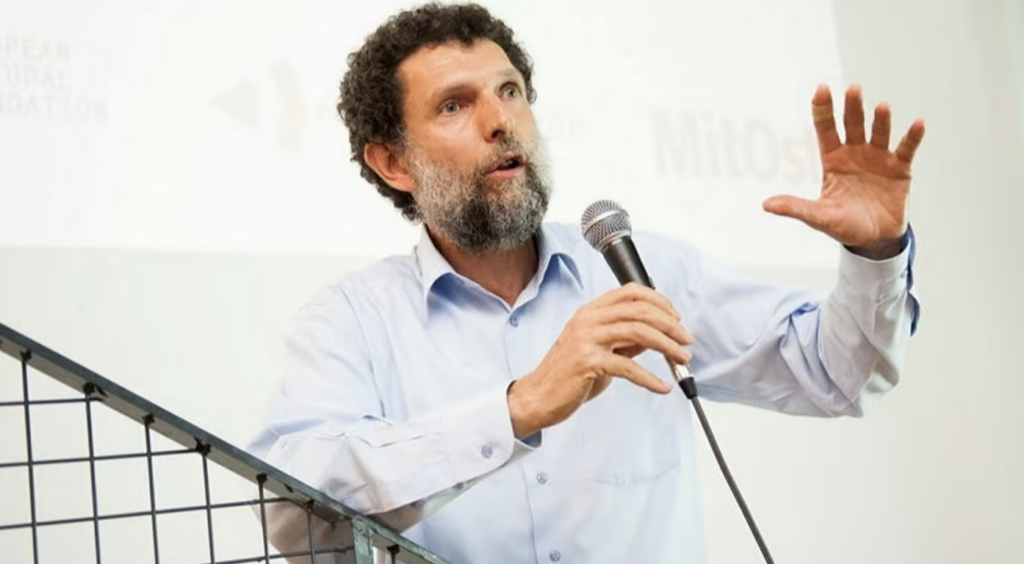
The imprisonment of Kavala on trumped-up charges of trying to overthrow the government was, as the FT editorial board wrote last year, “symbolic of the crackdown on dissent by . . . Erdoğan’s increasingly authoritarian regime”.
The Kurdish problem
The Kurdish issue emerged immediately after the republic’s creation when a rebellion erupted in 1925 in Kurdish-populated areas of south-eastern Turkey. As Murat Metinsoy, a professor of political science and history at Istanbul University, writes in the October issue of History Today, the Kurdish revolt was “the first religious and ethnic backlash against the republic”.
Since the 1980s, the Kurdistan Workers’ party (PKK) has kept up a violent insurgency in Turkey’s south-east. The suicide bombing of a government building in Ankara this month was a reminder of a problem that now seems no closer to a solution than in Atatürk’s era.
Earlier in his presidency, Erdoğan seemed interested in pursuing a Kurdish settlement, but those hopes have long since faded. The observations in 2012 of Kemal Derviş, a former Turkish economy minister who died in May, still ring true:
There is today a Kurdish identity that has developed beside the Turkish identity . . . There is therefore only one solution. Turkey’s Kurds must not engage in violence and must seek their goals within Turkey’s democracy, while Turkey must become a country where Kurds can fully live their culture and identity as they perceive it and want to live it, as citizens of Turkey.
Islam in Turkey
Under Atatürk, the secularisation of public life didn’t indicate that Turkey was shedding its Muslim identity — far from it. However, political Islam was kept firmly in check until the rise of the Welfare party in the 1990s and, later, Erdoğan’s Justice and Development party (AKP).
In recent years, Erdoğan has pushed Turkish public life in a more Islamic direction, taking such notable steps as easing a ban on women’s headscarves and reconverting Hagia Sophia, the former Byzantine cathedral in Istanbul that was a mosque in the Ottoman era and that Atatürk turned into a museum, back into a mosque.
Arguably, the real significance of Erdoğan’s initiatives is less their Islamic content than their embrace of a modern type of authoritarian nationalism that is by no means limited to Turkey.
Will economic orthodoxy return?
Finally, the economy. Atatürk introduced a form of state capitalism that left a lasting legacy for the Turkish economy. But the bigger question today is whether Erdoğan wants or is able to reverse the highly unorthodox policies of recent years, such as keeping interest rates way below inflation levels, that have caused much disruption to the economy.
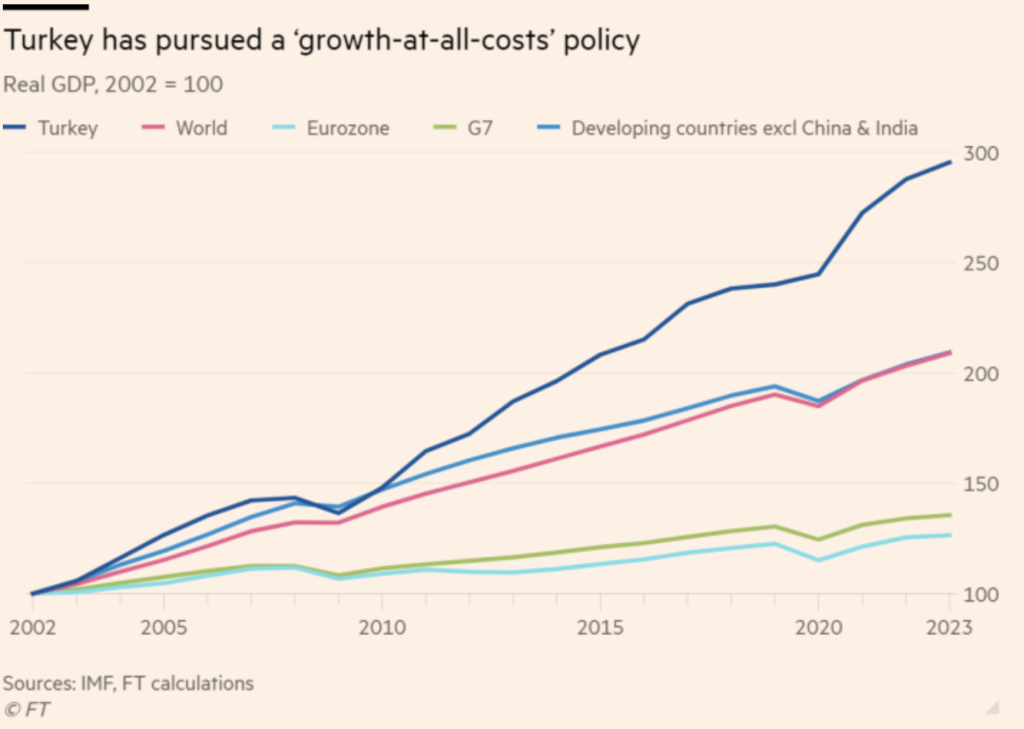
I recommend this excellent in-depth analysis by Adam Samson, the FT’s bureau chief in Turkey, which was published earlier this week.
Some commentators, such as Gönül Tol of the Washington-based Middle East Institute, contend that “instead of much-needed structural reforms, [Erdoğan] is after a quick fix” in economic matters.
In a deeper sense, as the republic’s 100th anniversary approaches, Erdoğan — who will turn 70 in February — undoubtedly wants to entrench the AKP’s political dominance in Turkey.
He must surely also have one eye on his historical legacy, hoping — I suspect — to make himself at least the equal of Atatürk, and perhaps his superior, in the memory of future Turkish generations.
Turkey can help the US offset its rivals in central Asia — a commentary by Ali Mammadov for the Atlantic Council
Tony’s picks of the week
Alternative for Germany sharply increased its share of the vote in two western German state elections this month, suggesting that the far-right party may be able to break out beyond its eastern German strongholds, the FT’s Guy Chazan reports from Berlin
Europe has some economic leverage in the Middle East, but it has stood for so many years on the sidelines of the region’s geopolitics that it is unlikely to wield much influence amid the Israel-Hamas confrontation, Pierre Vimont writes for the Carnegie Europe think-tank.

